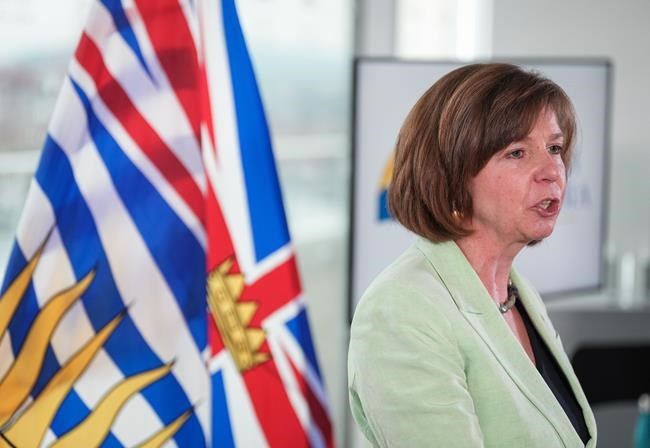
B.C. Minister of Mental Health and Addictions Sheila Malcolmson speaks during a news conference, in Vancouver, on Tuesday, May 31, 2022. More grim statistics from the BC Coroners Service show the rate of toxic drug deaths has doubled since the province declared a public health emergency in 2016. THE CANADIAN PRESS/Darryl Dyck
Republished September 15, 2022 - 6:07 PM
Original Publication Date September 15, 2022 - 11:36 AM
VANCOUVER - Maria Rantanen did everything she could to stop her son from fatally overdosing, but it wasn't enough.
Michael Rantanen died on July 15. He was 25 years old.
He was one of the 192 drug-related deaths British Columbia's coroner recorded in July. The toll is a 31 per cent increase from June and equates to about 6.2 deaths a day.
"I hope we see behind those statistics that it's really human beings who are dying in huge numbers. Six a day is just horrific," Maria Rantanen said in an interview Thursday. "I can't describe this feeling. It's like a part of me has been ripped out."
She said her son struggled with addiction for about six years and sought treatment several times. At the time of his death, she said Michael had a publicly funded mental health team, but those professionals were only available every few weeks.
"The resources are so thin," she said. "As a parent, you try to protect your kids when they're young and, even as adults, you always worry about them. We couldn't do it on our own. We needed help from somewhere else, and we never got it."
The grim statistics, released Thursday, also show the death rate across the province so far this year is 42 per 100,000, more than twice what it was in April 2016 when the public-health emergency was declared.
Dr. Paxton Bach, an addictions medicine doctor and co-director with the BC Centre On Substance Use, said treatment and interventions offered to people are too often siloed, inconsistent and difficult to access.
"We need to see a response from all sectors that is commensurate with the scale of the damage that's been wrought. That includes the federal government, the provincial government, municipal governments and society as a whole," he said. "We need to build a treatment system that is accessible, that is co-ordinated, that is patient-centred and that is flexible in helping meet people's needs."
He said the response to the illicit drug deaths should be similar to the way the province reacted to the COVID-19 pandemic.
Rantanen agreed mental health injuries should be treated just as rigorously as physical ailments. She said her son had sustained drug-related nerve damage to his knee in November that required surgery.
The operation, which took place in May and was ultimately successful, required a team of eight specialists.
"That really shows where our medical system shines," she said.
But while significant resources were allocated to rehabilitate his knee, the "root of the problem," his addiction, remained untreated, she said.
Bach said B.C. needs a more harmonized response to the growing death toll.
"Everyone's doing the best they can in their individual silo, but we don't have enough people working and we don't have them working in a co-ordinated fashion to accomplish those goals," he said in an interview Thursday.
"The result is that all of the effort of navigating that system is downloaded onto an individual patient and or their family members."
B.C. Mental Health and Addictions Minister Sheila Malcolmson said the street drug supply has grown increasingly toxic, with the concentration of fentanyl growing from about four to eight per cent in early 2020 to 23 per cent as of July this year.
She said the province is pushing to expand harm reduction services, including safe supply and overdose prevention sites, and is leading the country on decriminalization of people who use drugs.
"There is more to do. I am committed to continuing to expand and evolve our government's response to this public-health emergency to turn the tide and save lives," Malcolmson said in a statement.
No deaths have been reported at supervised consumption or drug overdose prevention sites.
Bach champions harm-reduction services, calling them the "most immediate way to reduce the risk of overdose", but reiterated that the issue requires an extensive approach.
"Any one of the things, whether that's doubling down on harm reduction, whether that's expanding access to safe supply, is still going to remain inadequate until we develop a comprehensive response."
The coroner service said the highest rates of death on a per-population basis were reported in the smaller B.C. communities of Lillooet, Mission, Terrace, Powell River and the Cariboo and Chilcotin regions.
"There is a perception that the overdose crisis is a Vancouver problem, or a Downtown Eastside problem, and it is clear, as soon as you look at the data, that is clearly false," Bach added.
Chief coroner Lisa Lapointe said families and communities across the province are suffering because of the sudden and tragic deaths of their loved ones.
"Whether they are chronically substance-dependent or using only occasionally, all of those who access the illicit drug market are vulnerable to serious harms," she said in a news release.
This report by The Canadian Press was first published Sept. 15, 2022.
News from © The Canadian Press, 2022